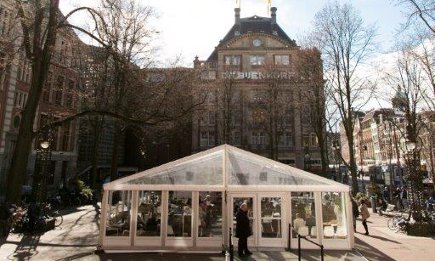“Quality demands Responsibility”

Due to the fiscal sequester after the fiscal cliff US Secretary of Education Arne Duncan was not able to visit the Teaching Summit in Amsterdam. Although Duncan was absent, the dynamism of the worldwide meeting was hardly altered, thanks to his excellent substitute.
Learning from the very best
Martha Kanter spoke with ScienceGuide about her vision on how to stimulate the quality of teachers and their motivation, a theme that suits her perfectly. Kanter started her career as a high school teacher. Before Kanter joined Obama’s cabinet she served as chancellor of one of the largest community college districts in the United States, making her the first Under Secretary not from traditional Academe, but with a background in the educational sector of the community colleges.
“I really like that the first Summit outside the US focusses on teacher’s quality. The reason we started to organize these Summits was to clearly formulate what we, the people and institutes that deal with education on a daily basis, expect from education, schools and teachers. When the standards are well-defined, teaching quality can be analyzed and where needed, stimulated.”
“Meanwhile, we wanted these Summits to learn from the best practices from other countries around the globe. Therefore we wanted to include leading countries in the fields of educational innovation and education quality. The international expertise of the OECD and educational organizations stimulate the Summits as well. This issue is too important for the United States to work on this on its own.”
“After two summits in New York we went outside and it is very inspiring to visit Amsterdam. It enables us to take an extra step in evaluating the progress we made these last years and examine our results using the experiences and expertise of others. That benefits all of us.”
Giant breakthrough
“We made a giant leap forward in the US by creating ‘Common Core Standards’. These now clearly communicate what is expected of students at each grade level. This allows our teachers to be better equipped and to know exactly what they need to help students learn and establish individualized benchmarks for them. The Common Core Standards empowers us to develop long term policies and to track their outcomes. That 46 states committed themselves to this means that we have reached a breakthrough on a national scale”.
“Measuring and evaluating the quality and achievements of teachers and their teams, is not done for getting these data and results as such, it is done to improve education. That is the key. We as a society, as parents and schools want to know whether our children achieve what we hope for, what is our ambition for them and our society. We want to give them the chances they deserve. Teachers have an awesome responsibility to realize this. Therefore we want to support them and strengthen their capacities.”
“It is a prerequisite to achieve that for them that we know how the quality of education is developing, what the results of teachers and schools are. Good indicators and effective evaluation and measurement systems are essential to achieve this. This Summit learned us a lot on this field and has strengthened and inspired us with practices from other countries. For example, we saw teachers that used multimedia to make peer-reviewing more dynamic and sophisticated.
More than facts and figures
“Analyzing and comparing facts and figures, nationally and internationally as well, is essential to make good decisions on how to improve quality and student achievements. Everybody at the Summit agreed on at. Quality demands responsibility. But keep in mind that education is more than just facts and figures. We need good data to be able to proceed with good policies, but I want more than that.”
“Education has a variety of aspects that are hard to capture in numbers: non-cognitive elements, cultural and social outcomes, etc. It is important to realize that a number or a dataset by itself does not give information on a trend you need or want to know more about. The added value of what a teacher or school does, can differ a lot between schools that score similarly. For these more complex aspects I do ask attention and elaborating on that complexity will help us forward.”
“Evaluation of quality of education and teaching is also an element of being open to society. This is stimulated and enhanced by good data. Education has to be open and transparent and show its value to society. Show what education and teachers are worth! That ‘Glassroom’ on the square in front of the building where the Teaching Summit was held, was such a powerful symbol. I was present at its opening and I thought it was wonderful. Washington needs a Glassroom as well.
Meest Gelezen
Wederom intimidatie van journalisten door universiteit, nu in Delft
‘Burgerschapsonderwijs moet ook verplicht worden in hbo en wo’
Raad van State: laat taaltoets nog niet gelden voor hbo-opleidingen
Vrouwen houden universiteit draaiende, maar krijgen daarvoor geen waardering
Extra geld voor bètafaculteiten is daar nooit terechtgekomen
